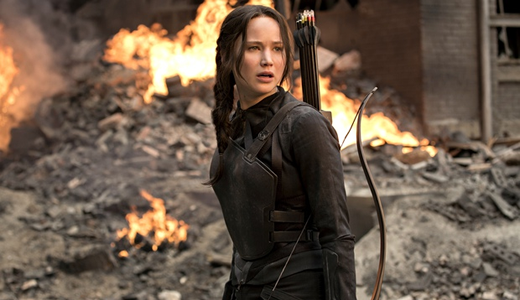The grand, bloody finale of The Hunger Games series—The Hunger Games: Mockingjay – Part 2—will plant its flag in theaters next week. Some have wondered how the movie will stay within the PG-13 rating, given how wrenching the book is, and I’m anticipating that it’ll be difficult for me to sit through.
Which, I think, is the whole point.
The Hunger Games movies were controversial from the get-go. When the first installment came out, many Plugged In readers were appalled by its central premise: a totalitarian government forcing teens to compete in a lethal reality show, wherein they’d kill each other until only one victor remained. And when Plugged In gave the original flick three-and-a-half plugs, many of them were shocked. How can you like a movie where kids are killing kids? They told us. That’s horrible!
And it was horrible. Author Suzanne Collins meant it to be.
“We’re so bombarded with imagery, and I worry that we’re all getting a little desensitized to it,” she told Scholastic. The crux of The Hunger Games came to her when she was channel surfing one night, flipping between reality television shows and coverage of the Iraq War. “And these two things began to sort of fuse together in a very unsettling way.”
“There’s just too much of our lives that we’re putting on television,” she adds. “When you’re watching real footage, actual tragedy unfold before you, that’s different. It is real life, and it isn’t going to go away when the commercial break comes on.”
When Collins wrote The Hunger Games, she explicitly drew parallels between the terrible gladiatorial contests from ancient Rome and today’s desensitized, entertainment-soaked culture. In my book Burning Bush 2.0, I wrote about some of those connections and suggest that some of the sacrifices we see in these stories—Katniss for Peeta, Peeta for Katniss, lots of other folks for both Peeta and Katniss—feel like echoes back to those early Christian martyrs in Rome. Martyrs who gave their very lives for something greater than themselves.
But The Hunger Games is not intended as a spiritual allegory. It is, and continues to be, Collins’ effort to show her readers and viewers the terrible cost of violence and war. She suggests that while it’s important to fight for what you believe in, there’s always a price you pay.
The folks who lambasted us for our favorable Hunger Games review way back when might’ve misconstrued Collins’ goals for the book and point of the movie, but they were wrong in the right way. They understood the validity of Collins’ point instinctively. If only others—including Lionsgate, the movie’s distributors—grasped it as well.
Lionsgate recently announced that it plans to open theme parks based on The Hunger Games. One will open in Dubai late next year. The next will be unveiled in Macau, China, as part of a 22,000-square-meter indoor “experience” center in 2018. And Lionsgate has plans to bring the franchise to life stateside in Atlanta come 2019.
“Will there be a giant cornucopia filled with weapons that visitors will have to run to at the start of each morning?” Quips CinemaBlend’s Sean O’Connell. “Instead of a traditional fireworks display, will each night end with cannon fire, signifying how many tourists gave their lives up in honor of the most exclusive, immersive vacation destination in film-fan history?”
While I’m sure the parks will be perfectly safe, the idea of shaping a theme park around the slaughter of innocents, fictional or no, feels in bad taste to me. After all, the whole point behind the Hunger Games is to really weigh how violence—even violence in the cause of entertainment—impacts us, and how we shouldn’t just go along for the ride.






Recent Comments